Actions
Community participation is an essential requirement for developing plans and efforts on the national cultural advancement, which is manifested in the four strategic actions, i.e. preservation, development, utilization, and empowerment.
The Law on Advancement of Culture outlines four strategic actions in promoting culture, i.e. preservation, development, utilization, and empowerment. Each action serves a specific need. Preservation, development, and utilization are aimed at strengthening elements in the cultural ecosystem, while empowerment aims to increase the capacity of human resources in the cultural ecosystem.
These four actions are integrally interconnected. The achievement of each action supports the other strategic actions. Therefore, the implementation of the four strategic actions is not to be carried out in stages or step by step, but simultaneously. It is only through this simultaneous implementation that the objectives of the Law on Advancement of Culture of “Indonesian people who are politically sovereign, economically independent, and culturally civilized” can be realized.
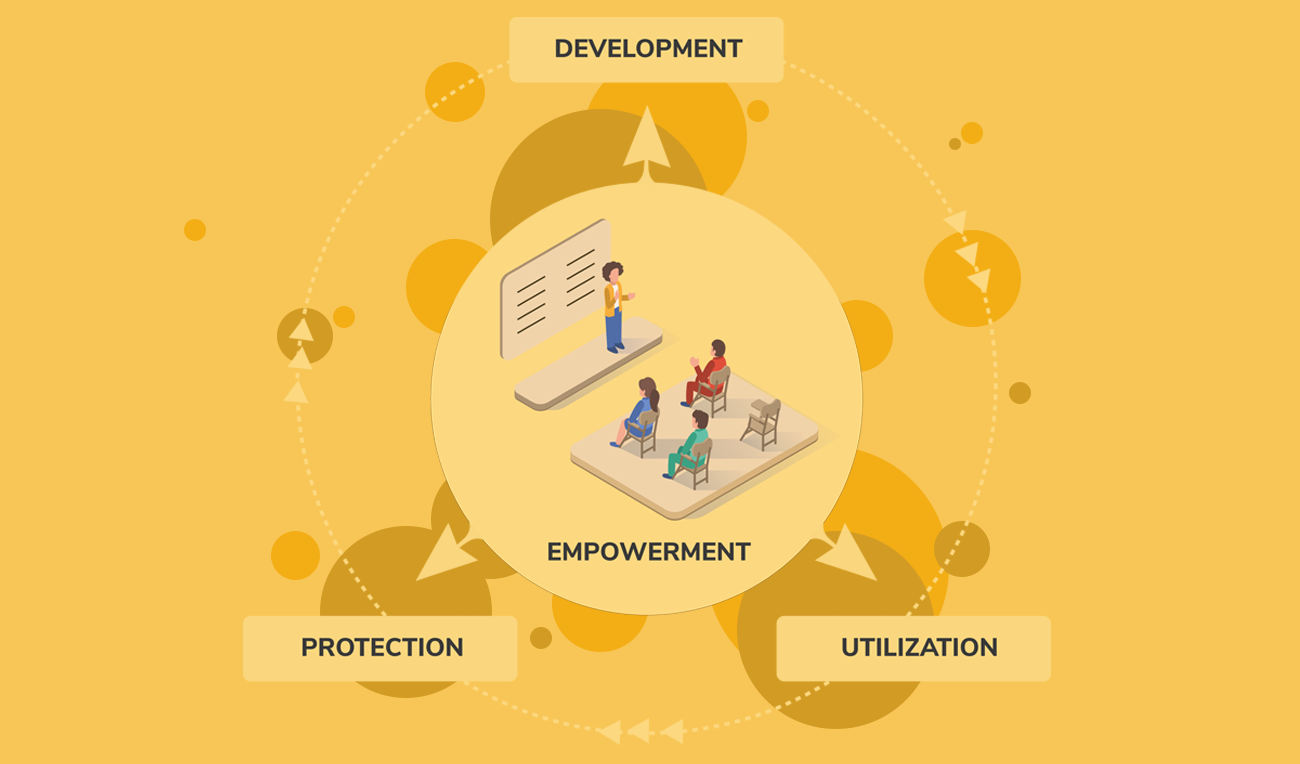
Work Details of the Four Strategic Actions
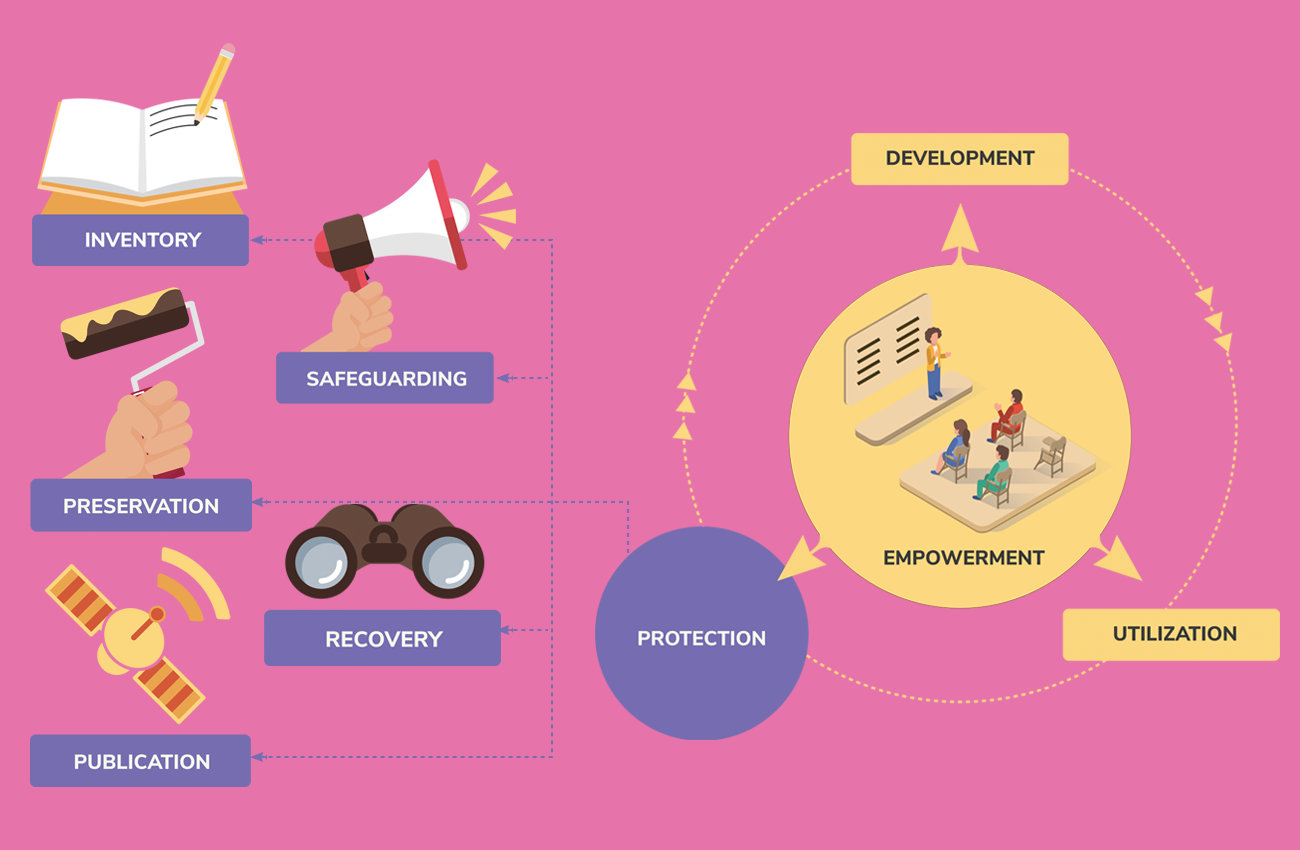
PROTECTION includes efforts to maintain the sustainability of culture as a heritage for the world and future generations. Protective measures for the promotion of culture are regulated in Articles 16 to 29 of the Law on Advancement of Culture. There are five types of protective measures that are considered strategic for the cultural advancement:
- INVENTORY is realized through the efforts of recording and documenting, determining, and updating data on the Object of Cultural Advancement. All collected data and information are uploaded in the Integrated Cultural Data Collection System, which is managed by the government and can be accessed by the public. Good data collection and information management is an essential requirement for effective cultural advancement efforts.
- SAFEGUARDING is realized through the introduction and management of the rights of the Indonesian people to the intellectual property of the Object for Cultural Advancement. It is aimed at fighting for national culture as a heritage for the world and future generations, as well as to prevent foreign parties from claiming intellectual property rights of national culture.
- PRESERVATION is realized through monitoring and managing the condition of the Object for Cultural Advancement. Preservation is carried out to prevent damage, loss, and even destruction of the elements that support the cultural ecosystem in Indonesia.
- RECOVERY is realized through revitalization, repatriation, and restoration of the Object for Cultural Advancement. Revitalization refers to efforts to revive cultural elements that have been or are almost destroyed by reviewing, excavating, re-engineering, and using them in everyday life. Repatriation is an effort to return elements of national culture that are outside the territory of the Republic of Indonesia into the country through purchases, return cooperation, and advocacy at the international level. Meanwhile, restoration is an effort to restore vulnerable or damaged cultural elements to their original condition.
- PUBLICATION is realized through the dissemination of information about the Object for Cultural Advancement to the public, at home and abroad, through various forms of media.
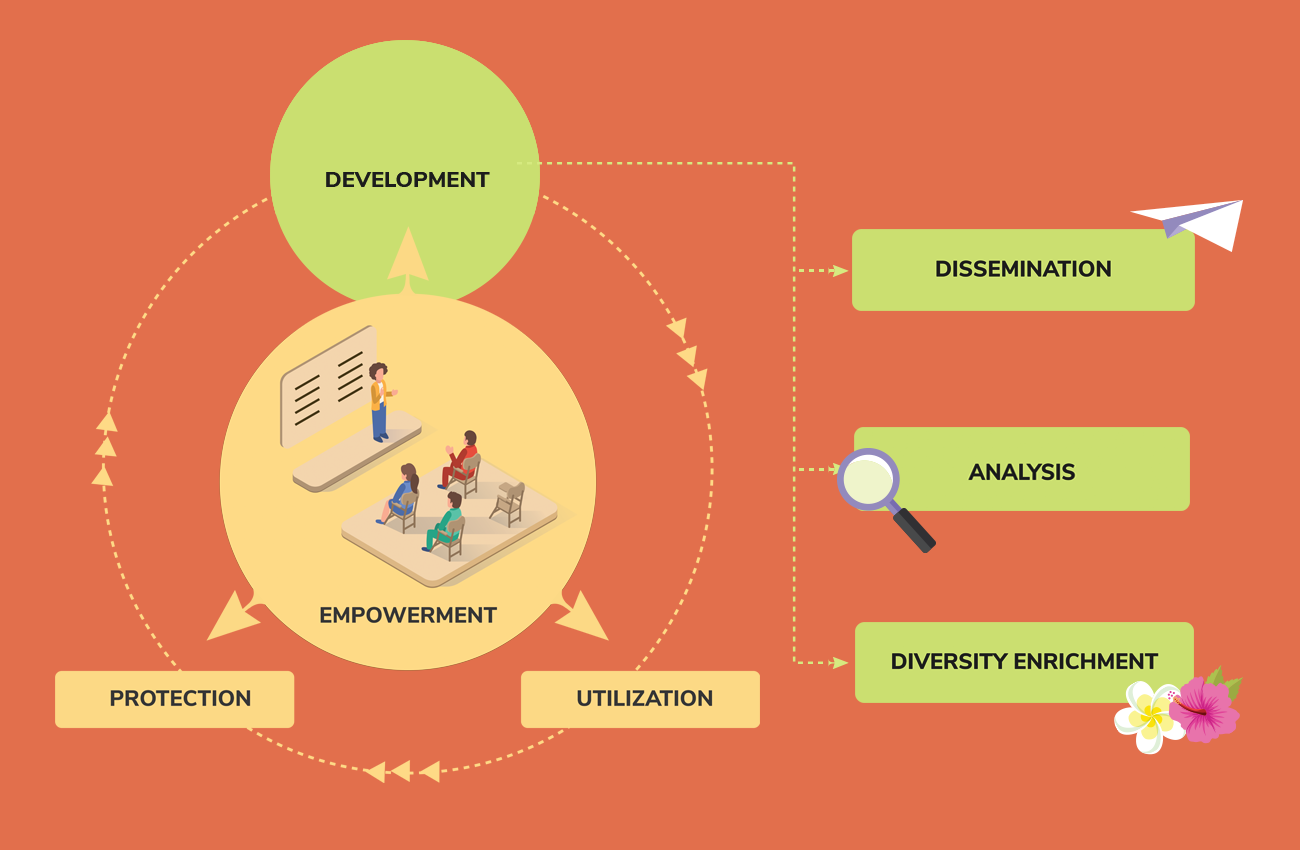
DEVELOPMENT includes efforts to empower the cultural ecosystem and enhance, enrich, and disseminate culture. Development measures for cultural advancement are regulated in Articles 30 and 31 of the Law on Advancement of Culture. There are three types of development measures that are considered strategic for the cultural advancement:
- DISSEMINATION is conducted through dissemination and diaspora. Dissemination is carried out, among others, through the dissemination of cultural values abroad, cultural exchanges, exhibitions, and festivals. Diaspora is carried out, among others, through the dissemination of cultural actors and cultural identities abroad.
- ANALYSIS is carried out through scientific research and other study methods to identify and explore the meaning and value of cultural elements in Indonesia. The results of the analysis will be useful for future cultural development plans and efforts.
- DIVERSITY ENRICHMENT is carried out through cultural incorporation (assimilation), cultural adjustment according to the context of space and time (adaptation), the production of new creations or creations resulting from the development of previous cultures (innovation), and the absorption of foreign cultures into Indonesian culture (acculturation).
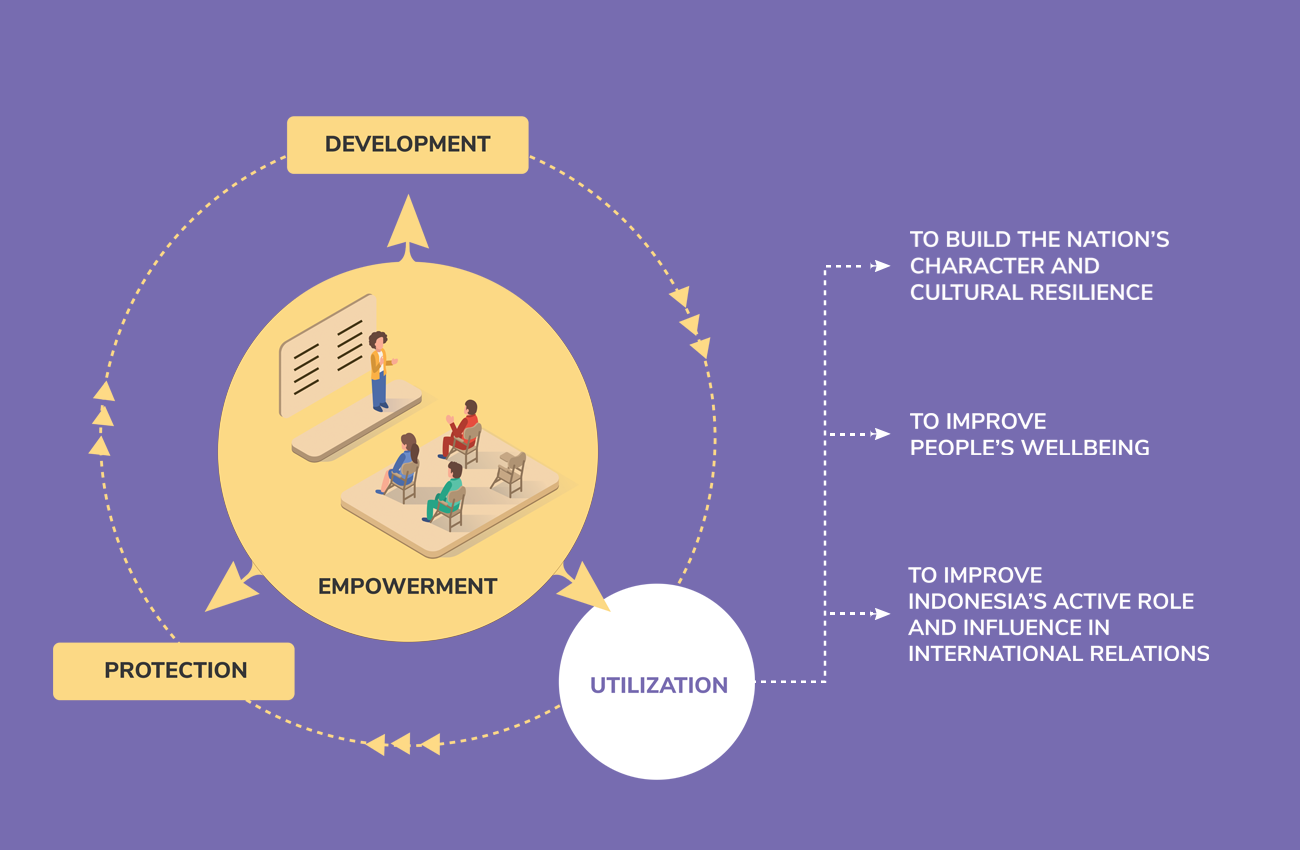
UTILIZATION includes efforts to utilize the Objects for the Cultural Advancement to strengthen ideology, politics, economy, social, culture, defense, and security in realizing the national goals. Utilization measures for cultural advancement are regulated in Articles 32 to 38 of the Law on Advancement of Culture. In general, there are three needs that are served through the utilization of the Object for Cultural Advancement:
- First, to build the nation’s character and cultural resilience. The scope is in the communality of Indonesian people. Utilization for this purpose is carried out through internalization of cultural values, innovation, increased adaptability to change, cross-cultural communication, and intercultural collaboration.
- Second, to improve the community’s wellbeing. The scope is in economic strength and resilience. Utilization for this purpose is carried out through processing the Objects for Cultural Advancement into industrial, trade, and tourism products. Ideally, the processing is carried out by paying attention to and maintaining noble values and the wisdom of related cultural elements. In addition, in order to revive and maintain the cultural ecosystem, the government must ensure that large industries and/or foreign parties who take advantage of the Object for Cultural Advancement share the profits obtained with the relevant components of society. Private or foreign parties who wish to take advantage of the Object for Cultural Advancement must obtain permission from the Ministry of Education and Culture.
- Third, to increase Indonesia’s active role and influence in international relations. The scope lies in Indonesia’s position as part of the world’s citizens and its relationship with the culture of other nations. Utilization for this purpose is carried out through cultural diplomacy and increased international cooperation in the cultural field.
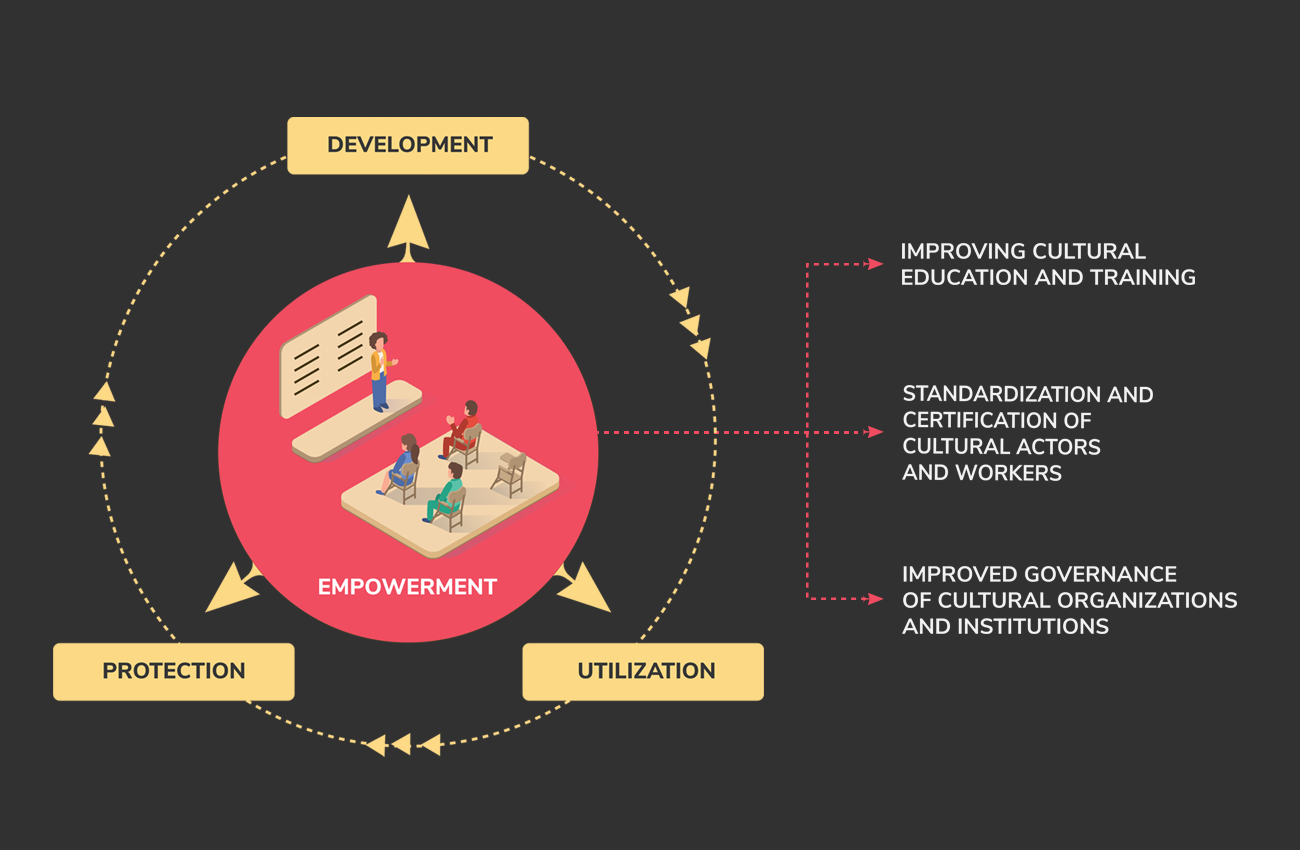
EMPOWERMENT includes the efforts of human resources in increasing and expanding the active role and initiatives of the community in the culture advancement. This is carried out to increase the number and capacity of actors, organizations, and institutions of culture. Empowerment measures for the advancement of culture are regulated in Articles 39 and 40 of the Law on Advancement of Culture. There are three types of empowerment actions that are considered strategic for the cultural advancement:
- Improving education and training in the field of culture
- Standardization and certification of the actors and workers in the field of culture
- Improved governance of organizations and institutions in the field of culture
PROTECTION

PROTECTION includes efforts to maintain the sustainability of culture as a heritage for the world and future generations. Protective measures for the promotion of culture are regulated in Articles 16 to 29 of the Law on Advancement of Culture. There are five types of protective measures that are considered strategic for the cultural advancement:
- INVENTORY is realized through the efforts of recording and documenting, determining, and updating data on the Object of Cultural Advancement. All collected data and information are uploaded in the Integrated Cultural Data Collection System, which is managed by the government and can be accessed by the public. Good data collection and information management is an essential requirement for effective cultural advancement efforts.
- SAFEGUARDING is realized through the introduction and management of the rights of the Indonesian people to the intellectual property of the Object for Cultural Advancement. It is aimed at fighting for national culture as a heritage for the world and future generations, as well as to prevent foreign parties from claiming intellectual property rights of national culture.
- PRESERVATION is realized through monitoring and managing the condition of the Object for Cultural Advancement. Preservation is carried out to prevent damage, loss, and even destruction of the elements that support the cultural ecosystem in Indonesia.
- RECOVERY is realized through revitalization, repatriation, and restoration of the Object for Cultural Advancement. Revitalization refers to efforts to revive cultural elements that have been or are almost destroyed by reviewing, excavating, re-engineering, and using them in everyday life. Repatriation is an effort to return elements of national culture that are outside the territory of the Republic of Indonesia into the country through purchases, return cooperation, and advocacy at the international level. Meanwhile, restoration is an effort to restore vulnerable or damaged cultural elements to their original condition.
- PUBLICATION is realized through the dissemination of information about the Object for Cultural Advancement to the public, at home and abroad, through various forms of media.
DEVELOPMENT

DEVELOPMENT includes efforts to empower the cultural ecosystem and enhance, enrich, and disseminate culture. Development measures for cultural advancement are regulated in Articles 30 and 31 of the Law on Advancement of Culture. There are three types of development measures that are considered strategic for the cultural advancement:
- DISSEMINATION is conducted through dissemination and diaspora. Dissemination is carried out, among others, through the dissemination of cultural values abroad, cultural exchanges, exhibitions, and festivals. Diaspora is carried out, among others, through the dissemination of cultural actors and cultural identities abroad.
- ANALYSIS is carried out through scientific research and other study methods to identify and explore the meaning and value of cultural elements in Indonesia. The results of the analysis will be useful for future cultural development plans and efforts.
- DIVERSITY ENRICHMENT is carried out through cultural incorporation (assimilation), cultural adjustment according to the context of space and time (adaptation), the production of new creations or creations resulting from the development of previous cultures (innovation), and the absorption of foreign cultures into Indonesian culture (acculturation).
UTILIZATION

UTILIZATION includes efforts to utilize the Objects for the Cultural Advancement to strengthen ideology, politics, economy, social, culture, defense, and security in realizing the national goals. Utilization measures for cultural advancement are regulated in Articles 32 to 38 of the Law on Advancement of Culture. In general, there are three needs that are served through the utilization of the Object for Cultural Advancement:
- First, to build the nation’s character and cultural resilience. The scope is in the communality of Indonesian people. Utilization for this purpose is carried out through internalization of cultural values, innovation, increased adaptability to change, cross-cultural communication, and intercultural collaboration.
- Second, to improve the community’s wellbeing. The scope is in economic strength and resilience. Utilization for this purpose is carried out through processing the Objects for Cultural Advancement into industrial, trade, and tourism products. Ideally, the processing is carried out by paying attention to and maintaining noble values and the wisdom of related cultural elements. In addition, in order to revive and maintain the cultural ecosystem, the government must ensure that large industries and/or foreign parties who take advantage of the Object for Cultural Advancement share the profits obtained with the relevant components of society. Private or foreign parties who wish to take advantage of the Object for Cultural Advancement must obtain permission from the Ministry of Education and Culture.
- Third, to increase Indonesia’s active role and influence in international relations. The scope lies in Indonesia’s position as part of the world’s citizens and its relationship with the culture of other nations. Utilization for this purpose is carried out through cultural diplomacy and increased international cooperation in the cultural field.
EMPOWERMENT

EMPOWERMENT includes the efforts of human resources in increasing and expanding the active role and initiatives of the community in the culture advancement. This is carried out to increase the number and capacity of actors, organizations, and institutions of culture. Empowerment measures for the advancement of culture are regulated in Articles 39 and 40 of the Law on Advancement of Culture. There are three types of empowerment actions that are considered strategic for the cultural advancement:
- Improving education and training in the field of culture
- Standardization and certification of the actors and workers in the field of culture
- Improved governance of organizations and institutions in the field of culture
Formulating Cultural White Papers
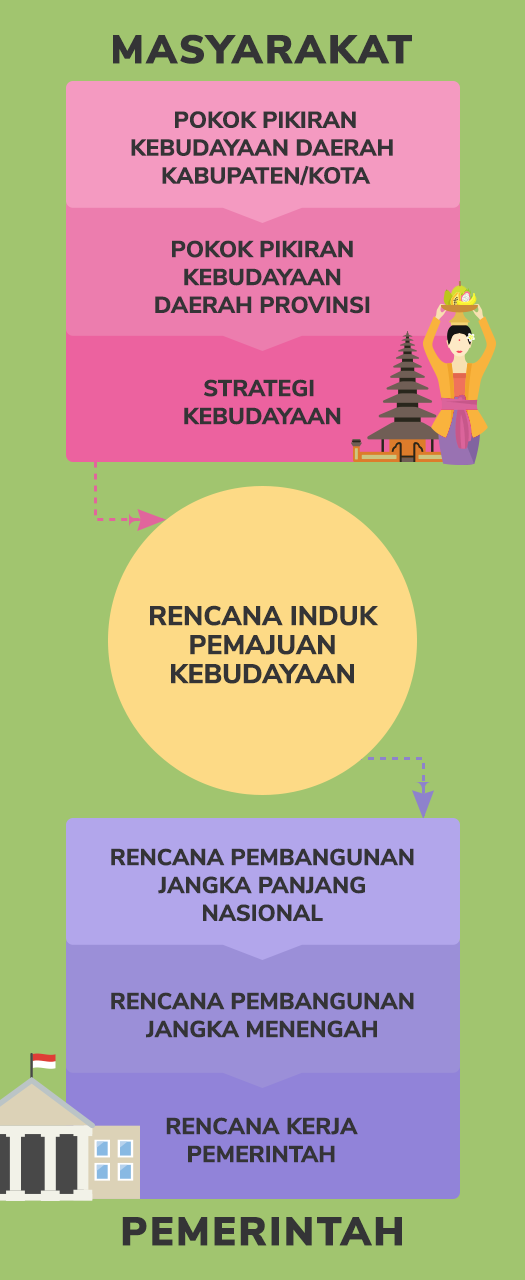
Efforts to promote culture are guided by four documents, i.e. the District/Municipality Cultural White Papers, Provincial Cultural White Papers, Cultural Strategy, and Master Plan for Advancement of Culture. The four documents are arranged in stages through four stages—public participation is essential at every stage of preparation.
First, the development of the Document on District/Municipality Cultural White Papers. This document summarizes the conditions, situations, and potentials in each region. The formulation of the document involves the community as well as experts in the field of local culture, with the support of the district/municipality government.
Second, the development of the Document on Provincial Cultural White Papers. The mechanism is more or less the same as the first stage; however, this time it is carried out at the provincial level.
Third, the development of the Cultural Strategy document. This document summarizes the entire Regional Cultural White Papers, which are processed into a vision for cultural advancement for the next two decades. This document also summarizes various strategic issues, processes, and methods to realize the vision for cultural advancement that has been declared. The formulation of the cultural strategy involves the community through experts who have competence and credibility related to objects of cultural advancement.
Fourth, the development of the Master Plan for Advancement of Culture. This document is technical in nature. It serves to translate the points in the Cultural Strategy into the government’s work procedure on culture for the next two decades. The formulation of this document is supervised by the Minister of Education and Culture, in coordination with the relevant ministries/institutions.
Throughout the process, the government plays a larger role as a facilitator who accompanies the community in the formulation of cultural advancement, by accommodating the participation and aspirations of all stakeholders. The government is also present as a guide for the community’s efforts in advancing culture, so that it remains in harmony with the applicable laws and regulations. Based on these designs, the government together with the community works to reach cultural advancement, from the local to the national level.
